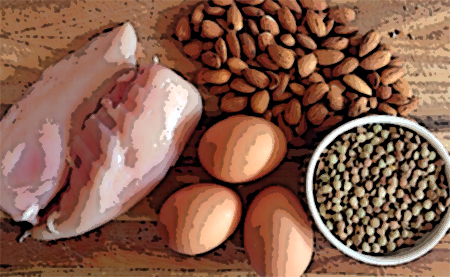
Author: Stephen Fratini, Ph.D, 2-Dooz Advisory Board Member
This is the inaugural post in the “bRx™ Integrative Health Blog.” It is the first in a series of articles regarding the nutritional importance of protein, with a focus on indispensible amino acids (IAA), the essential building blocks of protein.
bRx is a featured 2-Dooz project. The mission of bRx is to be a leading catalyst for patient driven integrative care, which delivers higher value, more compliant outcomes.
The content in this article is strictly informational and is not meant as a professional diagnosis or treatment for any ailment. Readers are encouraged to discuss this article with their personal doctor/physician.
If you’re interested in health related issues (or even if you’re not), you’ve probably heard or read about the importance of protein. Some of the recent growth in interest regarding protein may be driven, in part, by more folks considering a vegetarian diet or at least a diet that entails the consumption of less meat. Several major fast-food restaurants are now offering meatless burgers [1], to address the interest in meat alternatives. Still, the percentage of Americans who consider themselves to be vegetarians has remained stable for the past two decades (see the Gallop poll [2] ). This points more to an interest in reducing, but not eliminating meat consumption. In any event, whether you are a vegetarian, vegetarian-want-to-be or a meat-eater, you should be aware of your protein needs.
Protein fulfills many essential roles in the human body.
-
Protein is critical in the maintenance of body tissue, including development and repair. Protein is a major component in hair, skin, eyes, muscles and organs.
-
Protein is required for the creation of many hormones. For example, the hormone insulin is a small protein that regulates blood sugar. Other examples of protein-based hormones (sometimes called peptide hormones) are glucagon (a blood sugar-regulating hormone) and prolactin (which stimulates milk production).
-
Enzymes are proteins that increase the rate of chemical reactions in the body, including and ironically, for example, the digestion of protein. Most chemical reactions in the body would proceed too slowly without the help of enzymes.
-
Several amino acids (i.e., arginine, carnitine, GABA, phenylalanine and tryptophan) in protein can help to curb appetite [3]. In general, higher-level of protein consumption increases the satiety (appetite-suppressing) hormones GLP-1, peptide YY and cholecystokinin, while reducing levels of the appetite-increasing hormone ghrelin [4] [5].
-
Protein forms antibodies that help prevent infection, illness and disease. These proteins help to identify and destroy harmful bacteria and viruses.
-
Various stressors on the body require additional protein consumption. Those with high activity levels and folks recovering from serious (or even not so serious) illness require more protein to rebuild. Other conditions, e.g., stress, poor digestion, lessen the body’s ability to process protein and thus additional protein is required in such cases.
Protein is essential for our bodies to function properly. Sources of protein include animal and plant sources as well as supplements such as protein powders. In a follow-up blog, we discuss amino acids and protein quality.
References:
[1] “Plant-based 'meat' is conquering fast food”, Business Insider, https://www.businessinsider.com/burger-king-tgi-fridays-chains-sell-plant-based-meat-2019-5
[2] “What Percentage of Americans Are Vegetarian?”, https://news.gallup.com/poll/267074/percentage-americans-vegetarian.aspx
[3] Eric R. Braverman, M.D., The Healing Nutrients Within, 3rd edition, 2003.
[4] Lejeune MP, Westerterp KR, Adam TC, Luscombe-Marsh ND, Westerterp-Plantenga MS, “Ghrelin and glucagon-like peptide 1 concentrations, 24-h satiety, and energy and substrate metabolism during a high-protein diet and measured in a respiration chamber”, Am J Clin Nutr. 2006 Jan; 83(1):89-94.
[5] Blom WA1, Lluch A, Stafleu A, Vinoy S, Holst JJ, Schaafsma G, Hendriks HF, “Effect of a high-protein breakfast on the postprandial ghrelin response”, Am J Clin Nutr. 2006 Feb;83(2):211-20.